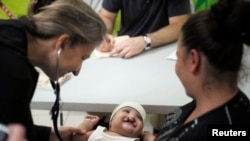Each year, U.S. hospitals and medical centers are left with thousands of kilos of medical supplies that have been prepared for surgeries but not used. A charity run by medical students has been collecting these still-usable supplies for 25 years and donating them to hospitals and clinics in developing countries.
The supplies from SHARE (Supporting Hospitals Abroad with Resources and Equipment), including surgical towels, gloves, trays and dressing kits, would normally be recycled as medical waste. But the volunteers at Johns Hopkins School of Medicine in Baltimore, Maryland, collect and sort the items and arrange to have them shipped to surgery centers in 24 nations.
SHARE donates 5,000 kilograms of supplies from American hospitals each year, but the students say only a small fraction of unused supplies are being recovered. In a study published in the World Journal of Surgery, they report that 232 academic hospitals in the U.S. could potentially donate 900,000 kilograms of supplies annually — equipment valued at more than $15 million. Wan said SHARE hopes to increase the number of participating U.S. hospitals.
SHARE collects only those items that foreign surgical centers request, according to Eric Wan, a recent Johns Hopkins graduate who led the study. He said the program does not want to generate more waste in other countries.
"If they need it and can use it and they know how to use it, then we can ship it to them," Wan said. "But if they can not use it or they do not have the capacity to use it, then we prefer not to send it to them, because then it just sits there."
SHARE's recipient nations work through charities on the ground, including Operation Smile, which provides free surgeries to correct children's facial deformities; the Neuro-Spine Research and Human Development Organization; and the Chiapas Project, which provides free medical and dental care to the indigenous Zoque people of Mexico's Chiapas state. They pay the cost of shipping and resterilizing the items for reuse in places where they are needed the most.
"Sometimes they are used for emergency surgery, and sometimes they are not used for emergency surgery," Wan said. "So our goal is that in the end, we save and improve lives."
Details of the SHARE program were presented at the annual meeting of the Clinical Congress of the American College of Surgeons in San Francisco.




